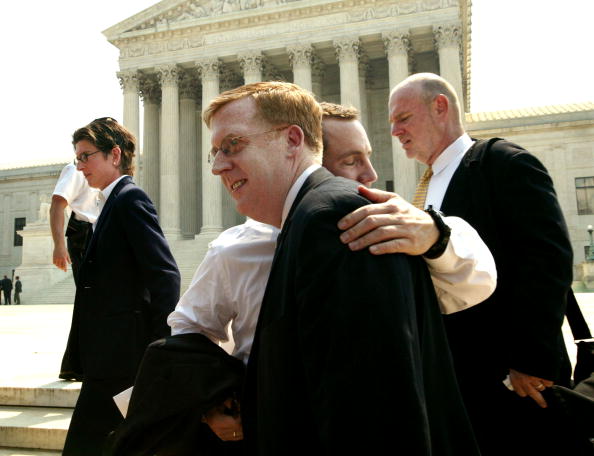For some parties in LGBTQ landmark cases, June 26 is a special day

“My arms shot up in the air. There was a lot of screaming among the lawyers,” says Roberta Kaplan regarding the 2013 U.S. Supreme Court opinion that struck down a law banning federal benefits to same-sex married couples. Pictured are Edie Windsor (from left), the respondent; Jaren Janghorbani, counsel for Windsor; Rachel Lavine, Kaplan’s wife; Kaplan, who argued the case; and Julie Fink, counsel for Windsor. Photo courtesy of Roberta Kaplan.
Before Roberta Kaplan read the 2013 U.S. Supreme Court opinion that struck down a law banning federal benefits to same-sex married couples, she knew that her client Edie Windsor had won because the majority was written by then-Justice Anthony Kennedy, who had authored earlier opinions supporting same-sex rights. And there was a dissent from then-Justice Antonin Scalia, who had a history of voting against same-sex rights.
“My arms shot up in the air. There was a lot of screaming among the lawyers, including me, my wife and a friend of ours who was there started crying,” Kaplan says.
She adds that United States v. Windsor had a huge impact on her family.
“But throughout the case, based largely on the way I was trained as a lawyer, I tried very hard to keep that out of the picture. I don’t think I let myself feel that feeling until the decision came out that morning,” says Kaplan, a partner with Kaplan Hecker & Fink. She worked at Paul, Weiss, Rifkind, Wharton & Garrison when the decision came down.
The Supreme Court ruled 5-4 in Windsor, with the majority finding that the Defense of Marriage Act violated the Fifth Amendment’s due process clause. In the past 20 years, it’s one of three landmark Supreme Court cases about LGBTQ rights published June 26.
An earlier case striking down same-sex sodomy laws, Lawrence v. Texas, was published on June 26, 2003. Obergefell v. Hodges, in which the Supreme Court found that same-sex marriage is a right protected by the Constitution, was published June 26, 2015.
 Bill Hohengarten and Paul M. Smith (forefront), attorneys for plaintiffs John Lawrence and Tyron Garner, hug outside the U.S. Supreme Court building June 26, 2003, in Washington, D.C. “There’s a theory [Pride Month] ought to be a national holiday,” jokes Smith, a former partner at Jenner & Block who now is senior vice president at the Campaign Legal Center. Photo by David Hume Kennerly/Getty Images.
Bill Hohengarten and Paul M. Smith (forefront), attorneys for plaintiffs John Lawrence and Tyron Garner, hug outside the U.S. Supreme Court building June 26, 2003, in Washington, D.C. “There’s a theory [Pride Month] ought to be a national holiday,” jokes Smith, a former partner at Jenner & Block who now is senior vice president at the Campaign Legal Center. Photo by David Hume Kennerly/Getty Images.
Although June is Pride Month, the June 26 dates are not particularly surprising, says Paul M. Smith, who argued Lawrence. The Supreme Court’s term wraps up during the end of June, and the high court often saves the most major opinions for the last day, he explains.
“There’s a theory it ought to be a national holiday,” jokes Smith, a former partner at Jenner & Block who now is senior vice president at the Campaign Legal Center.
In Lawrence, the majority found that “homosexual conduct” laws were unconstitutional, and all adults have the fundamental liberty to private sexual intimacy—not just heterosexuals. The vote was 6-3, with Kennedy writing for the majority.
Smith, like Kaplan, is an openly gay lawyer. Smith says it became more common for gay lawyers to be out starting in the 1980s during the AIDS epidemic. But being out was still a concern for many, he adds, particularly those licensed in jurisdictions with laws that criminalized consensual same-sex activity.
“If lawyers were too out, would they be admitting that they were on a regular basis violating criminal laws in that state? That was a problem. It was a problem many people chose to overlook when people came out, but it was still an issue for sure,” he adds.
Besides Lawrence and Windsor, Kennedy wrote for the majority in Obergefell, which was a 5-4 vote. That case was argued by Mary L. Bonauto, who was one of the lead attorneys. Bonauto is senior director of civil rights and legal strategies with the GLBTQ Legal Advocates & Defenders, known as GLAD.
“LGBTQ+ people and families have so much to give to their communities. Being respected as people and as families is to everyone’s benefit,” Bonauto told the ABA Journal in an email.
Support for the freedom to marry has continued to grow, Bonauto adds, but she also notes that LGBTQ+ rights are “under siege” in some states, and she specifically mentioned transgender people.
Shannon Minter, legal director with the National Center for Lesbian Rights, agrees. A former commissioner with the ABA’s Commission on Sexual Orientation and Gender Identity, he also received the organization’s Stonewall Award in 2022.
“Thus far, our nation’s courts have struck down nearly every such law that has been challenged, and it is likely the Supreme Court will once again be called upon to vindicate the principle of equality for transgender people in particular,” Minter told the Journal in an email.
See also:
ABAJournal.com: “Attorney for Lawrence v. Texas reflects on LGBTQ rights on 20th anniversary”



